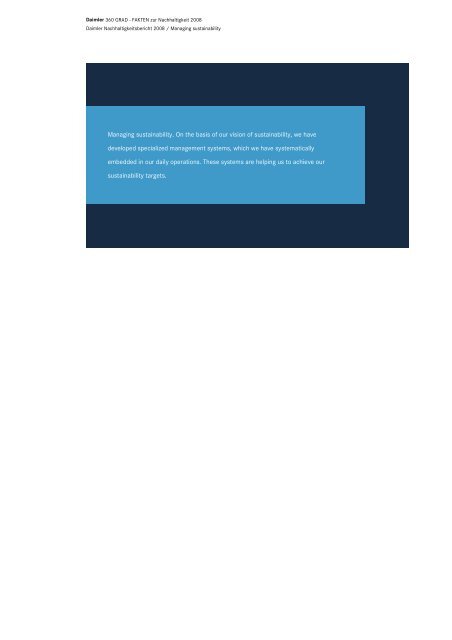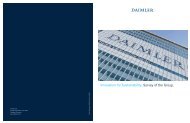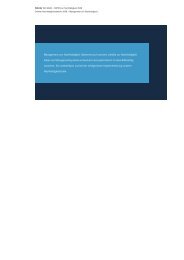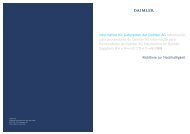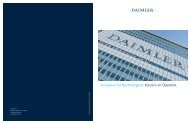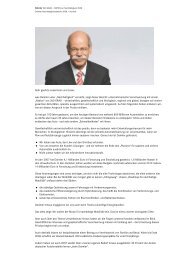Download Chapter - Nachhaltigkeitsbericht 2008 - Daimler
Download Chapter - Nachhaltigkeitsbericht 2008 - Daimler
Download Chapter - Nachhaltigkeitsbericht 2008 - Daimler
Create successful ePaper yourself
Turn your PDF publications into a flip-book with our unique Google optimized e-Paper software.
<strong>Daimler</strong> 360 GRAD - FAKTEN zur Nachhaltigkeit <strong>2008</strong><br />
<strong>Daimler</strong> <strong>Nachhaltigkeitsbericht</strong> <strong>2008</strong> / Managing sustainability<br />
Managing sustainability. On the basis of our vision of sustainability, we have<br />
developed specialized management systems, which we have systematically<br />
embedded in our daily operations. These systems are helping us to achieve our<br />
sustainability targets.
<strong>Daimler</strong> 360 GRAD - FAKTEN zur Nachhaltigkeit <strong>2008</strong><br />
<strong>Daimler</strong> <strong>Nachhaltigkeitsbericht</strong> <strong>2008</strong> / Managing sustainability / Expanding sustainability management<br />
Expanding sustainability management<br />
By creating a Sustainability Board at the top management level, <strong>Daimler</strong> has further systematized and optimized<br />
its sustainability management. In line with a Board of Management resolution from April <strong>2008</strong>, the Group<br />
combines all of the management processes relevant to sustainability in the Sustainability Board. This committee,<br />
which is directly responsible to the Chairman, coordinates significant sustainability measures throughout the<br />
Group and supports the operating units as they put solutions into practice.<br />
The Sustainability Board complements existing management structures and committees within the Group, such<br />
as the Corporate Environmental Protection unit, the Business Practices Committee in the Legal & Compliance<br />
unit, and the Global Diversity Office in the area of human resources. In addition, the Sustainability Board<br />
supports the strategic and operative control of sustainability-related activities at every level – from the Board of<br />
Management to the individual workstation. Sustainability management in the area of corporate environmental<br />
protection, in the area of compliance, and in the area of human resources.<br />
The Sustainability Board is managed by the Board of Management member responsible for corporate<br />
development/ strategy. The Sustainability Board’s proposals for more extensive activities are submitted to the<br />
Board of Management for approval.<br />
The <strong>Daimler</strong> Sustainability Board, which meets at least four times a year, consists of eight representatives of<br />
<strong>Daimler</strong>’s top management. The cross-divisional functions represented include:<br />
Communications<br />
Corporate Development/Strategy<br />
Corporate Research & Environmental Protection<br />
Global Procurement<br />
Human Resources<br />
Investor Relations<br />
Legal & Compliance<br />
Public Policy and External Affairs
<strong>Daimler</strong> 360 GRAD - FAKTEN zur Nachhaltigkeit <strong>2008</strong><br />
<strong>Daimler</strong> <strong>Nachhaltigkeitsbericht</strong> <strong>2008</strong> / Managing sustainability / Expanding sustainability management<br />
Sustainability governance structure<br />
The <strong>Daimler</strong> Sustainability Board is supported by a cross-divisional team (Sustainability Office) at the operational<br />
level. Depending on the issue, high-ranking representatives from Mercedes-Benz Cars, <strong>Daimler</strong> Trucks,<br />
Mercedes-Benz Vans, <strong>Daimler</strong> Buses, and <strong>Daimler</strong> Financial Services are actively integrated into the sustainability<br />
management process.
<strong>Daimler</strong> 360 GRAD - FAKTEN zur Nachhaltigkeit <strong>2008</strong><br />
<strong>Daimler</strong> <strong>Nachhaltigkeitsbericht</strong> <strong>2008</strong> / Managing sustainability / Responsible corporate management<br />
Responsible corporate management<br />
As a company listed on the stock exchanges, <strong>Daimler</strong> has an obligation to its shareholders and stakeholders.<br />
Responsible and continually evolving corporate management with smoothly functioning organs and efficient tools<br />
for guidance and control is needed in order to systematically exploit development potential and minimize<br />
business risks.
<strong>Daimler</strong> 360 GRAD - FAKTEN zur Nachhaltigkeit <strong>2008</strong><br />
<strong>Daimler</strong> <strong>Nachhaltigkeitsbericht</strong> <strong>2008</strong> / Managing sustainability / Responsible corporate management / Corporate Governance<br />
Corporate Governance<br />
Because our corporate headquarters are in Germany, the formal structure of our corporate governance has<br />
primarily been defined by German law. We also need to comply with the additional requirements placed on us by<br />
the fact that we are listed on the New York Stock Exchange. The competencies of our three corporate bodies –<br />
the Annual Meeting, the Board of Management, and the Supervisory Board – are regulated by legal provisions.<br />
The dual management system in accordance with German stock corporation law is approved through the strict<br />
separation between the executive (Board of Management) and monitoring (Supervisory Board) organs. (see the<br />
diagram below).<br />
Corporate governance at <strong>Daimler</strong>
<strong>Daimler</strong> 360 GRAD - FAKTEN zur Nachhaltigkeit <strong>2008</strong><br />
<strong>Daimler</strong> <strong>Nachhaltigkeitsbericht</strong> <strong>2008</strong> / Managing sustainability / Responsible corporate management / Our standards of business conduct<br />
Our standards of business conduct<br />
We have formulated our benchmarks for good corporate management in our standards of appropriate business<br />
conduct, which include laws as well as internal policies and guidelines. Ensuring compliance with these<br />
standards in all of our business processes is the task of corporate management. Three units in particular are<br />
involved in this area:<br />
The Legal department communicates the basic legal principles with which the company, its employees and,<br />
in particular, senior managers must comply;<br />
Corporate Compliance (CCO) develops and communicates guidelines and procedures for application in daily<br />
business operations;<br />
Corporate Auditing conducts monitoring and audits within the organization in order to find out whether any of<br />
our business processes harbor unusual risks for the Group and whether they are in line with general legal<br />
requirements as well as our internal policies and guidelines.<br />
In 1999 we formulated the <strong>Daimler</strong> Integrity Code, a comprehensive set of guidelines for professional conduct<br />
that applies to all employees without exception. In 2003 we supplemented the Integrity Code with our Principles<br />
of Social Responsibility and our Code of Ethics.<br />
The basic principles underlying our guidelines for professional conduct are translated into regulations for<br />
employee behavior by specific Group policies and guidelines. These Corporate Policies & Guidelines, which were<br />
laid down in 2006, are an important aid to orientation regarding the Group’s complex business operations. In<br />
2007 our compliance organization supplemented the compliance program with a set of central corporate policies<br />
and corporate guidelines. For example, it worked closely with the Human Resources department to institute our<br />
“zero tolerance” corporate policy as well as a guideline regarding the uniform, fair, and transparent application of<br />
disciplinary measures.<br />
Our target for <strong>2008</strong> is to further improve the clarity and transparency of our standards of business conduct. In a<br />
policy cleanup process, we will examine all of our guidelines to ensure that they are up to date and optimize or<br />
discontinue any guidelines and policies which are no longer current. We have defined comprehensive criteria to<br />
this end. The optimized and standardized rules and regulations will in future be known as the “House of Policies.”
<strong>Daimler</strong> 360 GRAD - FAKTEN zur Nachhaltigkeit <strong>2008</strong><br />
<strong>Daimler</strong> <strong>Nachhaltigkeitsbericht</strong> <strong>2008</strong> / Managing sustainability / Responsible corporate management / Compliance<br />
Compliance<br />
We reject on principle any kind of business activity that is illegal or is in contravention with our values and<br />
fundamental principles. The task of Corporate Compliance at <strong>Daimler</strong> is to promote and demand appropriate<br />
business conduct in line with this principle among all employees.<br />
Corporate Compliance (CCO) was established in early 2006. It is headed by the Chief Compliance Officer,<br />
appointed in <strong>2008</strong>, who is also head of the Legal department and reports directly to the Board of Management.<br />
CCO creates framework conditions and develops measures aimed at safeguarding <strong>Daimler</strong> and its employees<br />
from unethical decisions and preventing inappropriate conduct.<br />
At the beginning of 2006, the <strong>Daimler</strong> Board of Management appointed a Compliance Committee comprising<br />
high-ranking managers from various units. This committee defines and manages the implementation of our<br />
compliance program. It also reviews and initiates the systematic integration of compliance aspects into our<br />
business processes and authorizes all related corporate guidelines.<br />
Framework<br />
The Chief Compliance Officer regularly informs the Board of Management, the Compliance Committee, and the<br />
Audit Committee of the Supervisory Board about the current status of compliance activities within the Group. In<br />
addition, we have appointed an independent external consultant who monitors the efficiency and effectiveness of<br />
the compliance program and advises the Supervisory Board, the Audit Committee, and the Board of<br />
Management.<br />
We’ve made good progress in our efforts to create a culture of sustained compliance in our company. With the<br />
CCO, we have created a strong management organization. We have also initiated a transformation of our<br />
corporate culture that is in line with our corporate values and will establish compliance in all of our business<br />
units and business processes.
<strong>Daimler</strong> 360 GRAD - FAKTEN zur Nachhaltigkeit <strong>2008</strong><br />
<strong>Daimler</strong> <strong>Nachhaltigkeitsbericht</strong> <strong>2008</strong> / Managing sustainability / Responsible corporate management / Compliance<br />
Promoting awareness<br />
We have instituted a variety of measures to ensure that the rules for compliance are clearly implemented in our<br />
day-to-day business operations. For example, compliance issues are continually communicated in our internal<br />
media and are on the agenda of manager training sessions, informational and qualification events, and special<br />
qualification programs. In the last two years, <strong>Daimler</strong> AG has conducted in-depth classroom courses for<br />
approximately 9,000 employees, approximately half of whom were managers. In addition, 3,000 employees<br />
completed a precisely defined e-learning program and 26,000 employees used an animated compliance<br />
communication tool. At its business locations all over the world, <strong>Daimler</strong> has appointed more than 50<br />
Compliance Managers who support the local business units. It has also introduced new processes such as<br />
mandatory consultation in the case of business dealings with government parties and due diligence (verifying the<br />
integrity of new business partners).<br />
The Compliance Consultation Desk (CCD) is available to answer all questions submitted by employees on a<br />
strictly confidential basis; employees can also ask their questions anonymously if they wish. The CCD has<br />
processed more than 12,000 inquiries so far. Our employees and external partners can also report suspected<br />
inappropriate conduct to the Business Practices Office (BPO). The Business Practices Committee (BPC),which<br />
comprises representatives of top management, investigates all reported cases and takes appropriate measures.<br />
To ensure timely identification of risks and ensure an appropriate response, the CCO has introduced a<br />
compliance risk management system. Since the beginning of 2006, compliance reviews have been carried out in<br />
more than 30 sales companies or business units in over 25 countries. Moreover, in more than 50 companies or<br />
business units we have set up standardized control systems that are monitored by internal audit professionals.
<strong>Daimler</strong> 360 GRAD - FAKTEN zur Nachhaltigkeit <strong>2008</strong><br />
<strong>Daimler</strong> <strong>Nachhaltigkeitsbericht</strong> <strong>2008</strong> / Managing sustainability / Responsible corporate management / Risk management system<br />
Risk management system<br />
Within the framework of global operations, <strong>Daimler</strong>’s divisions are exposed to a large number of risks that are<br />
inextricably linked with their business activities. For the early detection, evaluation, and consistent management<br />
of risks, we use effective management and control instruments that are combined into a uniform risk<br />
management system which meets the applicable legal requirements. The main risk categories are economic<br />
risks, sector-specific risks (including environmental and social risks), and financial market risks.
<strong>Daimler</strong> 360 GRAD - FAKTEN zur Nachhaltigkeit <strong>2008</strong><br />
<strong>Daimler</strong> <strong>Nachhaltigkeitsbericht</strong> <strong>2008</strong> / Managing sustainability / Responsible corporate management / Risk management system /<br />
Structure of the risk management system*<br />
Structure of the risk management system*<br />
The risk management system is an integral part of the overall planning, control, and reporting process in all the<br />
relevant legal entities and central functions. It is based on a risk management handbook that describes in detail<br />
the methodological and procedural framework of risk management at <strong>Daimler</strong> AG.<br />
The aim of the process is to identify risks and evaluate them in terms of their probability and the amount of<br />
damage they could cause. Key risk categories that are monitored individually and in terms of their combined<br />
effect include the following:<br />
economic risks (for example, risks due to overall economic development in the core markets or the<br />
development of raw material prices);<br />
sector-specific and company-specific risks, including the images of all the <strong>Daimler</strong> brands, product quality,<br />
legal requirements and political circumstances, supplier risks, unforeseen events, and environmental risks —<br />
with regard to products (integration of environmental protection into the development process) as well as<br />
production;<br />
risks connected with financial markets (including market risks due to fluctuating exchange rates, interest<br />
rates, and share prices)<br />
The responsible persons also have the task of developing, and initiating as required, measures to avoid, reduce,<br />
and hedge risks, and to monitor risks within the framework of a regular controlling process. The risk<br />
management system enables the Board of Management to identify key risks at an early stage and to initiate<br />
suitable countermeasures. The Corporate Auditing department supports the Board of Management in monitoring<br />
the various functions and business units of our company. The integrated early warning system for risks, as well<br />
as the structure and implementation of risk management, are reviewed not only by the Corporate Auditing<br />
department but also by the auditors of our Consolidated Financial Statement.<br />
By means of risk-oriented reviews, the Corporate Auditing department helps to make corporate processes<br />
efficient and effective and to improve management quality in a sustained manner. As part of its review activities,<br />
the Corporate Auditing department informs the Board of Management, the Audit Committee, and the auditors of<br />
our Consolidated Financial Statement about its conclusions, suggestions for improvement, and the extent to<br />
which the suggestions have been implemented.<br />
As part of a reorganization process, the Corporate Audit department centralized all auditing functions, which had<br />
previously been distributed among various locations, in 2006. This made it possible to standardize and uniformly<br />
apply auditing processes throughout all the business areas and functions and to strengthen the independence of<br />
the Corporate Auditing department within the Group. We continued this process in 2007 and intensified it by<br />
creating a functionally oriented organization. By increasing the rotation of the employees in Corporate Auditing,<br />
we ensure, on the one hand, that the department has the requisite knowledge of all Group functions and<br />
business areas and, on the other, that the people going back into the business units promote risk awareness<br />
there.<br />
Further information is available in our Annual Report 2007.<br />
* Content on this page is available exclusively on the Internet.
<strong>Daimler</strong> 360 GRAD - FAKTEN zur Nachhaltigkeit <strong>2008</strong><br />
<strong>Daimler</strong> <strong>Nachhaltigkeitsbericht</strong> <strong>2008</strong> / Managing sustainability / Responsible corporate management / Risk management system /<br />
Compliance with competition law*<br />
Compliance with competition law*<br />
<strong>Daimler</strong>'s policy on antitrust issues is stipulated in its Integrity Code (page 20). Here it is stated that the<br />
company "complies fully with all applicable antitrust and trade laws and the corresponding laws on price setting,<br />
competition law, and consumer protection." It is further stated that these laws regulate "the company's relations<br />
with its competitors, suppliers, dealers, and customers. They prohibit agreements and other activities that fix or<br />
influence prices or conditions, divide up sales territories or customers, or illegally restrict free and open<br />
competition." Employees who have questions about these laws are asked to contact the Legal Affairs<br />
department.<br />
Integrity Code (PDF, 148 KB)<br />
<strong>Daimler</strong> AG Code of Ethics (PDF, 96 KB)<br />
* Content on this page is available exclusively on the Internet.
<strong>Daimler</strong> 360 GRAD - FAKTEN zur Nachhaltigkeit <strong>2008</strong><br />
<strong>Daimler</strong> <strong>Nachhaltigkeitsbericht</strong> <strong>2008</strong> / Managing sustainability / Responsible corporate management / Dialogue with public policy-makers<br />
Dialogue with public policy-makers<br />
In line with a Board of Management decision made in 2006, the Public Policy and External Affairs department is<br />
the coordination center for all dialogue with political decision- makers on issues relevant to our company. This<br />
department carries out advance monitoring of our lobbying activities to ensure compliance with our legal<br />
obligations and ethical standards. In addition, in 2007 we put in place specific standards for responsible<br />
lobbying. These guidelines are currently being reworked and will soon be downloadable at this site.
<strong>Daimler</strong> 360 GRAD - FAKTEN zur Nachhaltigkeit <strong>2008</strong><br />
<strong>Daimler</strong> <strong>Nachhaltigkeitsbericht</strong> <strong>2008</strong> / Managing sustainability / Responsible corporate management /<br />
Principles regarding donations and sponsorship<br />
Principles regarding donations and<br />
sponsorship<br />
For sponsorships and donations, <strong>Daimler</strong> has put into place clearly defined responsibilities, transparent donation<br />
processes, and efficient control systems. The company’s donation activities are coordinated and steered by the<br />
Legal department on the basis of our corporate guideline on charitable contributions. In 2006, the company<br />
established the “Review Board on Sponsorship & Donations,” which approves substantial requests for donations<br />
and sponsorships. A database compiles information on the company’s sponsorship and donation activities on a<br />
global scale to achieve greater transparency. In 2007, the company supported institutions and projects for<br />
charitable causes with social sponsorships and donations amounting to € 35.89 million (project budget only,<br />
figures without U.S. due to the transfer of our majority interest in Chrysler in 2007).<br />
In some countries <strong>Daimler</strong> supports its own foundations in order to consolidate the company’s activities directed<br />
toward social goals. Brand and product-related sponsorship is coordinated by the business units and Corporate<br />
Sponsoring.<br />
Starting in <strong>2008</strong>, instead of offering gifts to guests at our vehicle presentations around the world, we are<br />
donating the money we normally spend on such presents (altogether approximately € 90,000) to nonprofit<br />
organizations.<br />
In 2006 we introduced a separate set of rules as a guideline for donations to political parties. According to these<br />
rules, donations to political parties require authorization from the Board of Management on principle and are<br />
currently only permitted for parties in Germany.
<strong>Daimler</strong> 360 GRAD - FAKTEN zur Nachhaltigkeit <strong>2008</strong><br />
<strong>Daimler</strong> <strong>Nachhaltigkeitsbericht</strong> <strong>2008</strong> / Managing sustainability / Corporate management<br />
Corporate management<br />
The Board of Management controls the Group’s business activities jointly in accordance with the principle of<br />
collegiality.Notwithstanding the joint responsibility of Board of Management, each Board member manages his<br />
own portfolio on his own responsibility. After the demerger from Chrysler, the number of <strong>Daimler</strong> Board of<br />
Management members was reduced from nine to six. The Board’s functions include the strategic guidance of the<br />
Group and management of its daily business operations. It is also responsible for preparing the Annual Report<br />
and the corporate and interim reports, as well as for setting up and monitoring the risk management system.<br />
<strong>Daimler</strong> informs shareholders, financial analysts, shareholders’ associations, the media, and interested public<br />
about the situation of the Group and about any significant changes in its business.
<strong>Daimler</strong> 360 GRAD - FAKTEN zur Nachhaltigkeit <strong>2008</strong><br />
<strong>Daimler</strong> <strong>Nachhaltigkeitsbericht</strong> <strong>2008</strong> / Managing sustainability / Environmental management system<br />
Environmental management system<br />
Protecting the environment is a primary objective of the <strong>Daimler</strong> Group. It is a fixed component of our corporate<br />
strategy with basic objectives defined in the Group’s environmental protection guidelines, which are passed by<br />
the Board of Management and are binding for all of our employees and business locations (see box). A detailed<br />
version of the environmental guidelines is available as a PDF file in the <strong>Download</strong> Center.<br />
As an automaker we must keep environmental protection in mind throughout the entire lifecycle of our products<br />
- from deliveries by our suppliers to development, logistics, production, sales and utilization, as well as the<br />
disposal or recycling of end-of-life vehicles.<br />
The Group’s environmental protection guidelines<br />
We face the environmental challenges of the future by working continuously to improve the environmental<br />
performance of our products and operations.<br />
We strive to develop products which in their respective market segments are highly environmentally<br />
responsible.<br />
We plan all stages of manufacturing to provide optimal environmental protection.<br />
We endeavor to achieve exemplary environmental performance worldwide.<br />
We provide our employees and the public with comprehensive information on environmental protection.<br />
Production-related environmental protection. The certification of all our locations around the world in line with<br />
ISO 14001 and additional validation of our German locations by the EU’s Eco-Management and Audit Scheme<br />
(EMAS) are important elements of our environmental management system. The efficacy of the system is regularly<br />
audited by external experts. Today, more than 96 percent of our worldwide workforce is employed in production<br />
facilities with certified environmental management systems.<br />
The merging of the management systems for quality, environmental protection, and occupational health and<br />
safety into a single system is an important goal at <strong>Daimler</strong>. As a result, environmental protection tasks are being<br />
integrated even more fully into the core functions and processes of the respective units, instead of being dealt<br />
with as separate processes. An integrated concept has already been implemented since 2002 in the production<br />
facilities of Mercedes-Benz Cars around the world.<br />
In addition, our process for evaluating the environmental risks connected with our production facilities<br />
throughout the world helps us to identify environmental risks on the basis of uniform standards, minimize them,<br />
and thus to refine our preventive measures for environmental protection. These audits involve regular and<br />
systematic monitoring and assessment of the location’s environmental management system as well as the key<br />
areas of environmental protection, such as atmospheric emissions, wastewater, waste disposal, and handling of<br />
hazardous materials. Elimination of any existing environmental risks is a component of the target agreements<br />
concluded between the Board of Management and plant managements.<br />
Environmental protection in product development. Vehicle development takes place in a standardized process in<br />
which the vehicle specifications and quality gates (milestones in the development process) form the<br />
cornerstones. Environmental protection issues and requirements (fuel consumption, emissions, prohibited or<br />
prescribed materials, and recycling requirements) are an integral part of the vehicle specifications and are taken<br />
into account and managed throughout the entire product creation process within the framework of the quality<br />
gates.
<strong>Daimler</strong> 360 GRAD - FAKTEN zur Nachhaltigkeit <strong>2008</strong><br />
<strong>Daimler</strong> <strong>Nachhaltigkeitsbericht</strong> <strong>2008</strong> / Managing sustainability / Environmental management system / Organization of environmental management<br />
Organization of Group-wide environmental<br />
management<br />
We have developed clear structures, processes, and areas of responsibility which enable systematic pursuit of<br />
our environmental targets and make specific improvements (see the graphic). On behalf of the Board of<br />
Management of <strong>Daimler</strong> AG, the Board member responsible for Group Research and Mercedes-Benz Cars<br />
Development is also entrusted with the company’s environmental protection activities. In addition, we have<br />
established four functions or organizational units that are in charge of the central management of our<br />
environmental protection activities, as well as the cross-unit networking and communication of these activities:<br />
Corporate organization – environmental protection<br />
A Chief Environmental Officer has been appointed to coordinate environmental management throughout the<br />
Group. He has also been commissioned by the Board of Management to oversee the central environmental<br />
management system and to advise the Board on environmental issues.<br />
The corporate environmental protection unit (GR/ VGE) coordinates the operational requirements of Groupwide<br />
environmental management, including the analysis and implementation of legal requirements,<br />
monitoring progress toward environmental targets, defining and refining environmental standards, ensuring<br />
regular reporting on environmental issues, and risk management connected with environmental protection.<br />
The Global Product Environmental Council comprises the environmental officers for products as well as<br />
representatives of the Corporate Strategy, Public Policy and External Affairs, and Communications functions.<br />
The Council analyzes product-related environmental issues, sets targets, coordinates cross-unit<br />
environmental protection tasks, and initiates overarching environmental protection projects.<br />
Production-related environmental protection issues are dealt with by various regionally oriented committees<br />
that are coordinated by the Corporate Environmental Protection unit in cooperation with the Chief<br />
Environmental Officer.
<strong>Daimler</strong> 360 GRAD - FAKTEN zur Nachhaltigkeit <strong>2008</strong><br />
<strong>Daimler</strong> <strong>Nachhaltigkeitsbericht</strong> <strong>2008</strong> / Managing sustainability / Environmental management system / Environmental award for employees*<br />
Environmental award for employees*<br />
All of our employees are responsible for the success of our environmental protection measures. That’s why we<br />
organize training programs in the area of environmental protection for our workforce. In addition, every two years<br />
we run a Group-wide competition for the “Environmental Leadership Award” (ELA), which is granted in<br />
recognition of projects that promote environmental protection within the Group (see also “An award that<br />
promotes environmental protection”, below).<br />
An award that promotes environmental protection<br />
Since 2006, the Mercedes production plant in Untertürkheim has saved around 52 million kilowatt-hours of<br />
electric energy, 130 million kilowatt-hours of heat, and 500,000 cubic meters of drinking water. That’s a huge<br />
success for the environment and the company, thanks to the initiatives taken by an environmentally conscious<br />
and active workforce. A project team from the plant established a number of highly diverse approaches to saving<br />
energy; this was acknowledged with <strong>Daimler</strong>’s 2007 Environmental Leadership Award (ELA).<br />
Every two years, the company invites Group employees to compete for the ELA in the categories “Productionrelated<br />
environmental protection,” “Product-related environmental protection,” and “Outstanding environmental<br />
commitment.” Pioneering projects for advancing environmental protection and sustainability within the company<br />
are acknowledged with awards from the Board of Management. In this way, we are promoting the interest of our<br />
workforce in environmental protection and honoring their environmental commitment. The award winners in<br />
Untertürkheim optimized not only energy utilization in buildings and production facilities but also administrative<br />
processes. They also involved the workforce and the management in measures to implement their holistic<br />
concept for saving energy. By sensitizing their fellow employees to these issues, they achieved significant energy<br />
savings.<br />
Two other projects received the glass ELA trophies in 2007. In one of these projects, employees developed an<br />
emissions aftertreatment system for BLUETEC buses which fulfills the voluntary European Enhanced<br />
Environmentally Friendly Vehicles (EEV) standards and also applies to company vehicles. The other project<br />
successfully utilized an innovative technology for cleaning groundwater. In 2007, <strong>Daimler</strong> awarded the ELA for<br />
the sixth time, choosing the winners from the 67 projects that were submitted.<br />
Every two years since 2000, <strong>Daimler</strong> has been presenting its Environmental Leadership Award (ELA) to<br />
employees who have actively promoted environmental protection at the company. This brochure presents the<br />
finalists and winners in 2007.<br />
Environmental leadership award 07. Finalists and Winners (PDF, 2.9 MB)<br />
* Content on this page is available exclusively on the Internet.
<strong>Daimler</strong> 360 GRAD - FAKTEN zur Nachhaltigkeit <strong>2008</strong><br />
<strong>Daimler</strong> <strong>Nachhaltigkeitsbericht</strong> <strong>2008</strong> / Managing sustainability / Human resources management / Organization and management<br />
Organization and management<br />
The Human Resources organization of <strong>Daimler</strong> is an integral part of the Group’s management structure. The<br />
approximately 7,000 people working in this organization all over the world are responsible for all our employeerelated<br />
functions and processes. <strong>Daimler</strong> pursues a global human resources strategy that is in line with its<br />
corporate goals. It is based on five pillars: Profitability, Competitive Workforce, Leadership Capabilities, Employer<br />
of Choice, and Operational Excellence.<br />
HR management scheme – integrated HR functions<br />
The Board of Management member responsible for Human Resources, who is also the Group’s Labor Relations<br />
Director, is responsible for the human resources operations within the Group. The Human Resources<br />
organization is divided into three key areas:<br />
Group functions, which are responsible for human resources strategy, policy, and guidelines throughout the<br />
Group;<br />
divisional human resources functions, which are responsible for human resources work in the business units<br />
and Group locations, and for the implementation of the company’s human resources strategy;<br />
service centers, which provide human resources services at the regional level.<br />
The highest decision-making body in the Human Resources organization is the Human Resources Executive<br />
Committee. It consists of the heads of the corporate, divisional, and service functions within the Human<br />
Resources organization, and is headed by the Board of Management member responsible for Human Resources.<br />
The “Global Human Resources Scorecard” is an important management tool in this area. It, in turn, is an integral<br />
part of the strategic scorecard of the Group as a whole. Through the success factors and their performance<br />
measurement criteria (currently 14) – which are known as the key performance indicators (KPIs) – it is possible<br />
to compile global key figures concerning human resources in a targeted manner. This makes it possible to<br />
measure the success of human resources processes and strategies. The information gained in this manner is<br />
used to design the most important functional human resources measures in the goal agreement process of all<br />
human resources directors. The Global Human Resources Scorecard provides targeted support for the business<br />
strategies and processes in the divisions and creates the foundation for a continual mutual learning process<br />
within the Group through best practices.
<strong>Daimler</strong> 360 GRAD - FAKTEN zur Nachhaltigkeit <strong>2008</strong><br />
<strong>Daimler</strong> <strong>Nachhaltigkeitsbericht</strong> <strong>2008</strong> / Managing sustainability / Human resources management / Organization and management<br />
Global HR Scorecard – Erfolgsfaktoren und Key Performance Indicators (KPIs)
<strong>Daimler</strong> 360 GRAD - FAKTEN zur Nachhaltigkeit <strong>2008</strong><br />
<strong>Daimler</strong> <strong>Nachhaltigkeitsbericht</strong> <strong>2008</strong> / Managing sustainability / Human resources management / Principles of manager development<br />
Principles of manager development<br />
The development of managers at <strong>Daimler</strong> is carried out in strict accordance with a uniform process at all levels of<br />
the company worldwide: the Leadership, Evaluation, and Development Process, or LEAD for short. It has been<br />
refined and adjusted to the long-term strategic goals of the Group. In addition to simplifying the structure of the<br />
LEAD processes and making them more efficient, the refinement process focused on formulating the seven new<br />
“leadership competencies.” Derived from the corporate values, they provide a conceptual framework for<br />
managerial activities and a basis for evaluating and developing the <strong>Daimler</strong> management team.<br />
A manager<br />
thinks and acts strategically and provides orientation;<br />
acts in accordance with the needs of customers and markets;<br />
promotes innovation and structures processes of change;<br />
demands and promotes top performance and actively fosters employee development;<br />
promotes diversity and creates a culture of cooperation and learning;<br />
implements decisions and achieves agreed-upon objectives; and<br />
takes on responsibility and acts in a credible manner.<br />
The more detailed descriptions of the leadership competencies also include aspects such as sustainability,<br />
diversity, and social responsibility.<br />
A manager<br />
develops a realistic strategy for the sustainable further development of his or her own area of responsibility;<br />
acts with a sense of responsibility toward society, the environment, and all of the important interest groups;<br />
sets an example of ethically correct and responsible behavior, and also expects it from others;<br />
actively promotes the inclusion of different points of view and creates added value through diversity.
<strong>Daimler</strong> 360 GRAD - FAKTEN zur Nachhaltigkeit <strong>2008</strong><br />
<strong>Daimler</strong> <strong>Nachhaltigkeitsbericht</strong> <strong>2008</strong> / Managing sustainability / Management of supplier relations<br />
Management of supplier relations<br />
The global procurement strategy rests on three pillars:<br />
1. the ambition to achieve economies of scale worldwide<br />
2. successfully managing a global supplier base<br />
3. employing efficient processes and a tried and tested infrastructure.<br />
Because the transatlantic ties of the previous procurement organization GP&S were particularly strong in the<br />
area of processes and systems, the focus in <strong>2008</strong> is on creating new concepts and processes.<br />
We employ a global, performance-oriented approach in our dealings with suppliers. The focus here is on the four<br />
value drivers of quality, technology, costs, and logistics. Conduct also plays an important role, whereby the<br />
pertinent guidelines are derived from our principles of social responsibility. It is therefore crucial that an open<br />
and continuous exchange takes place regarding goals, requirements, and the progress that has been made. Just<br />
as we are committed to integrity, we also expect our suppliers to behave in accordance with ethical standards.
<strong>Daimler</strong> 360 GRAD - FAKTEN zur Nachhaltigkeit <strong>2008</strong><br />
<strong>Daimler</strong> <strong>Nachhaltigkeitsbericht</strong> <strong>2008</strong> / Managing sustainability / Dialogue with our stakeholders<br />
Management of dialogue with our<br />
stakeholders<br />
<strong>Daimler</strong> engages in dialogue with its stakeholders all over the world and includes them in its business operations.<br />
A critical factor for us in the identification and evaluation of our stakeholders is the question of whether, and to<br />
what extent, a specific group of people is affected by our company’s activities. The following major issues have<br />
turned out to be particularly important for this dialogue, and the Group has contact persons who are responsible<br />
for each of these issues.<br />
The Investor Relations unit is responsible for communicating with investors and shareholders;<br />
Corporate Environmental Protection coordinates the dialogue with stakeholders about environmental issues;<br />
the development units of the divisions are in charge of vehicle safety issues;<br />
Human Resources is responsible for contact and communication with the employees regarding personnel<br />
issues that affect them (both at headquarters and at the Group locations);<br />
our procurement organization engages in an ongoing dialogue with our suppliers and other automakers<br />
concerning social and environmental issues that are relevant to procurement;<br />
Public Policy and External Affairs and the Corporate Development team coordinate the dialogue with elected<br />
officials and governmental bodies and with associations regarding political and Group-related issues;<br />
Corporate Communication deals with media inquiries.<br />
The newly established Sustainability Board will play a key role in multi-issue and cross-divisional coordination. It<br />
will also consider the use of new and more extensive measures.<br />
Stakholders at <strong>Daimler</strong> – two-way relationships
<strong>Daimler</strong> 360 GRAD - FAKTEN zur Nachhaltigkeit <strong>2008</strong><br />
<strong>Daimler</strong> <strong>Nachhaltigkeitsbericht</strong> <strong>2008</strong> / Managing sustainability / Dialogue with our stakeholders / Dialogue with interest groups*<br />
Dialogue with interest groups*<br />
Since 2007 we have intensified our contacts with important stakeholder groups and initiated cooperative<br />
activities in key areas related to sustainability:<br />
Environment:<br />
We are working together with the United Nations Environmental Programme (UNEP), WWF, and the Ministry<br />
for Nutrition and Rural Areas of the German state of Baden-Württemberg on a project to define sustainability<br />
standards for the cultivation of biomass for biofuels.<br />
For many years now, <strong>Daimler</strong> has been a member of the German Environmental Management Association<br />
(B.A.U.M.); "econsense", a network of companies dedicated to sustainability; and the Forum for Sustainable<br />
Development.<br />
We've been working together with the Öko-Institut in Berlin since 2003 on the issues of reporting and<br />
environmental performance.<br />
We're also cooperating with environmental organizations, including the Global Nature Fund. In our dialogue<br />
with various environmental organizations such as BUND, Germanwatch, Greenpeace, and the European<br />
Federation for Transport and Environment, <strong>Daimler</strong> focuses in particular on the issues of CO 2 and emissions.<br />
Procurement/suppliers:<br />
In 2006 <strong>Daimler</strong> launched a two-year cooperative project called "Transparency in the Supply Chain" in order<br />
to generate sustainability reports by a select number of our suppliers. The project was initiated by the Global<br />
Reporting Initiative (GRI) and German Technical Cooperation (GTZ). In 2007 we carried out the associated<br />
workshops on site; the selected suppliers subsequently prepared their initial reports.<br />
As part of the further development of our cooperation model with the suppliers (Extended Enterprise) there<br />
were discussions at the top management level between the <strong>Daimler</strong> procurement organization and the<br />
suppliers. The participants of these discussions were specifically asked to provide feedback about the<br />
cooperation. Societal and environmental issues are also being discussed in an ongoing process of<br />
information exchange about daily business between suppliers and the procurement organization.<br />
In order to define the most uniform possible future standards for dealing with sustainability issues in the<br />
supply chain, <strong>Daimler</strong> AG is working closely with representatives of a number of other automakers. The aim<br />
of these talks is to share experiences and combine activities.<br />
Society:<br />
More information about concrete projects and cooperative activities is available in the section „Customers and<br />
Society“.<br />
* Content on this page is available exclusively on the Internet.
<strong>Daimler</strong> 360 GRAD - FAKTEN zur Nachhaltigkeit <strong>2008</strong><br />
<strong>Daimler</strong> <strong>Nachhaltigkeitsbericht</strong> <strong>2008</strong> / Managing sustainability / Customer relations management<br />
Customer relations management<br />
Through our brand positioning we have clearly defined what our customers can expect from Mercedes-Benz<br />
passenger cars: appreciation! In order to reliably fulfill this promise in all areas, Mercedes-Benz Cars established<br />
the long-term program “Customer Satisfaction No. 1” – “CSI No. 1” for short – in 2006. We cultivate customer<br />
satisfaction, and customer loyalty in particular, by endeavoring to exceed our customers’ expectations in terms<br />
of sales and service. Our objective is to attain the top position in customer satisfaction in the premium segment<br />
by the end of this decade. Because our customers always regard Mercedes-Benz as a unit, the CSI No. 1 program<br />
has been precisely defined with a concrete target. CSI No. 1 comprises the following:<br />
a specific, clearly structured, and prioritized program of action that begins with clear process descriptions at<br />
the point of sale<br />
a purposeful training program and customized consulting<br />
measurable performance criteria, and new incentive models that offer the right kind of motivation.<br />
For Mercedes-Benz Cars, CSI No. 1 is therefore a strategy that differentiates us from our competitors and lays<br />
the groundwork for sustainable growth and profitability, so that we can exceed our customers’ expectations in<br />
sales and after-sales (service).<br />
At <strong>Daimler</strong> Trucks as well, customer satisfaction is a top priority. “Our passion is to make our customers<br />
successful with our products and services,” according to a Truck Group statement about its values. On the basis<br />
of this claim, <strong>Daimler</strong> Trucks has established a customer relations management system that is tailored to the<br />
specific needs of customers from diverse sectors. It takes account of customer satisfaction not only in<br />
purchasing, but over a vehicle’s entire service life.


